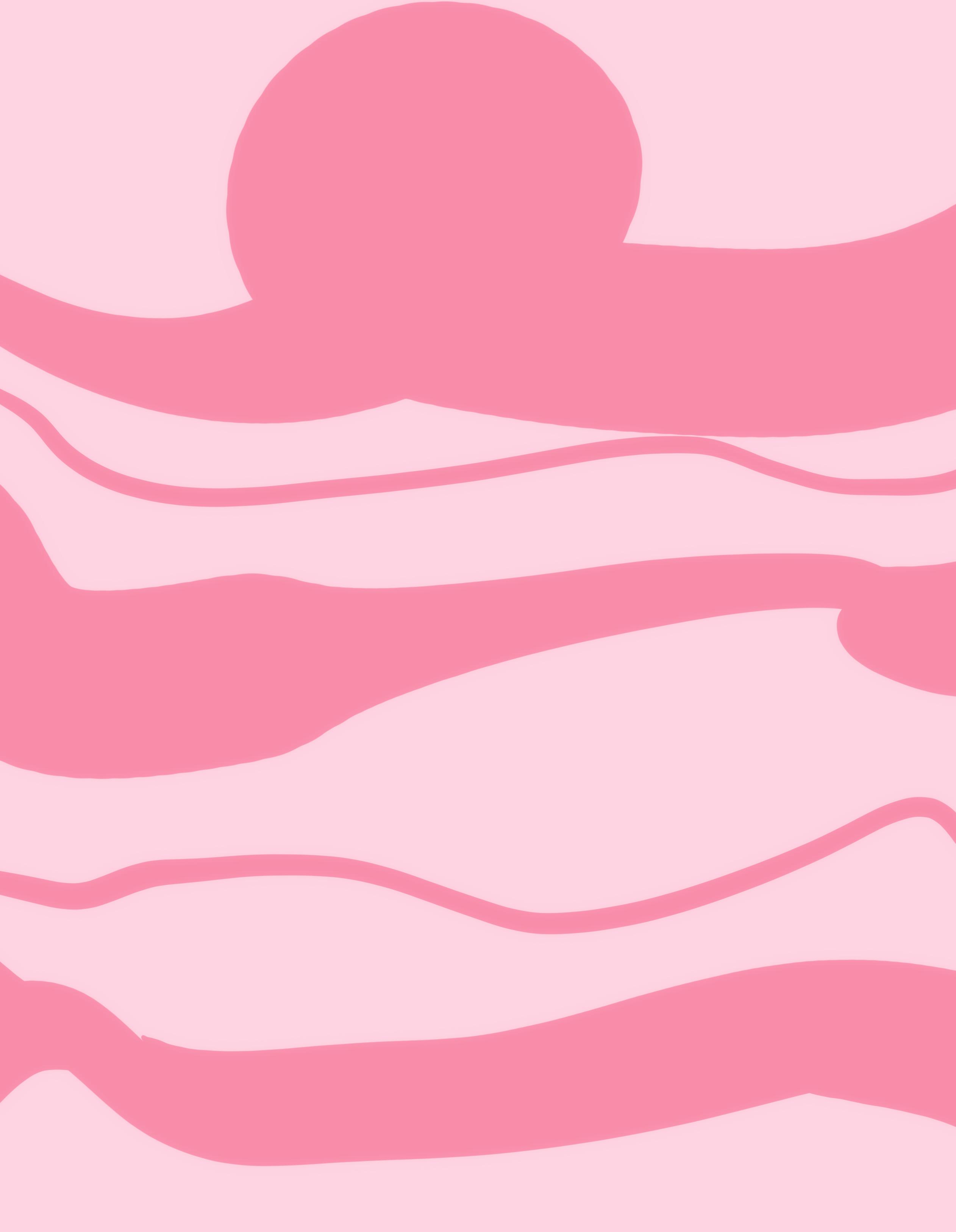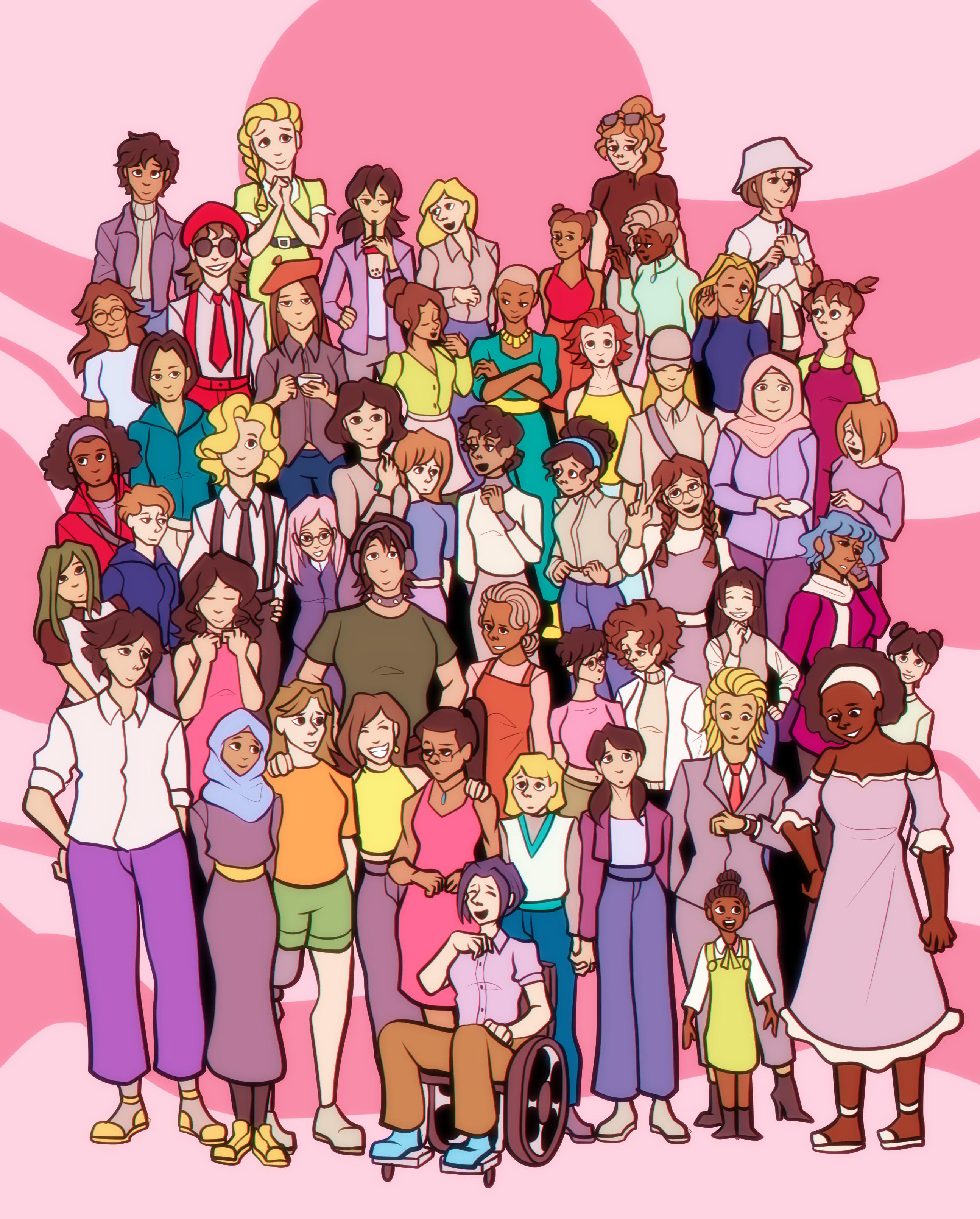
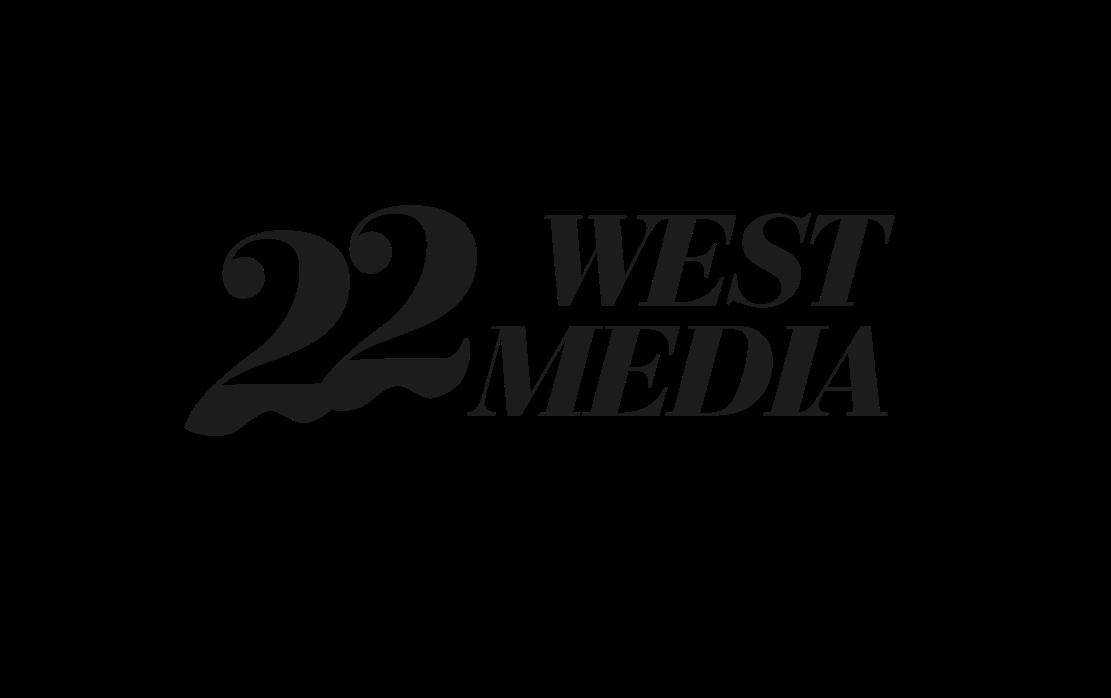
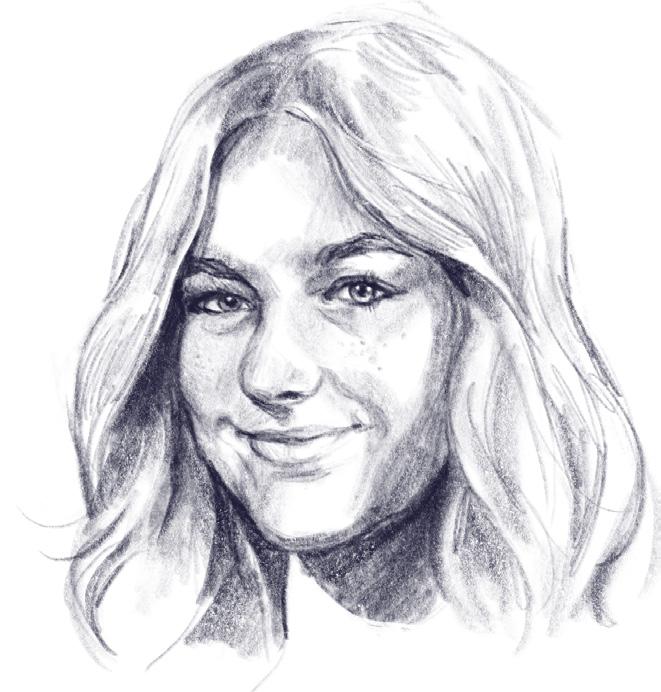
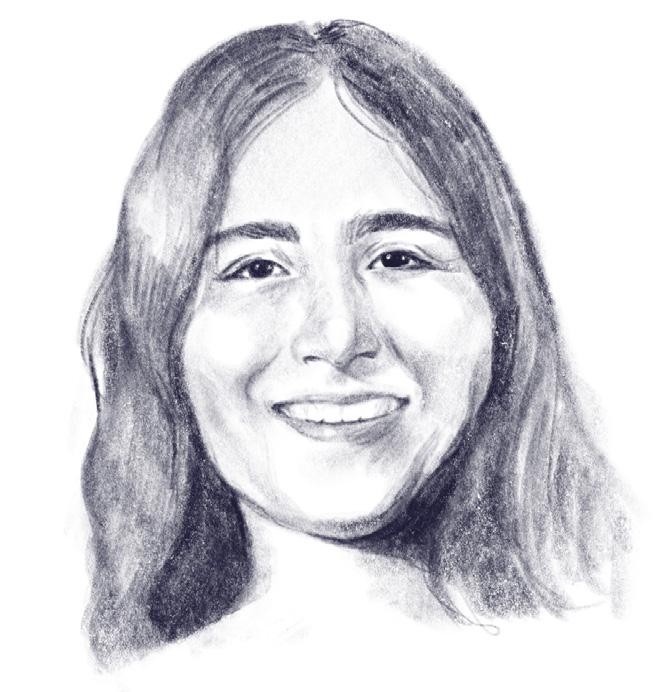
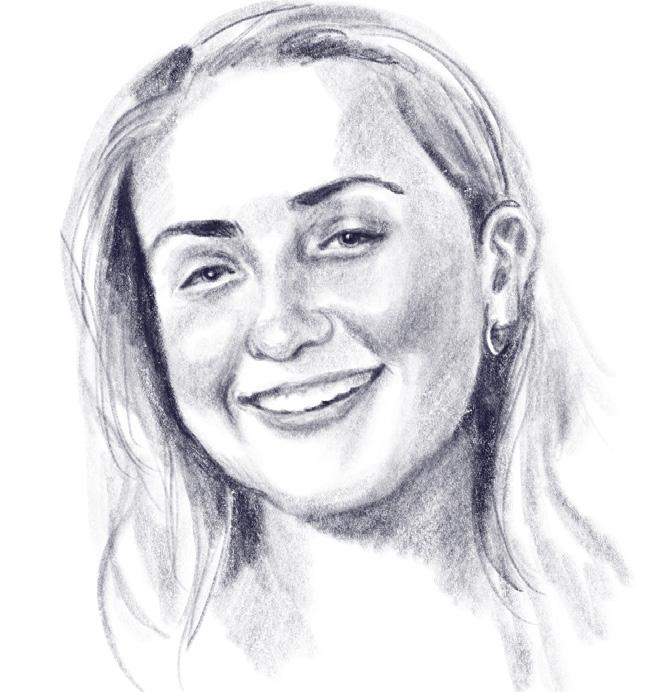
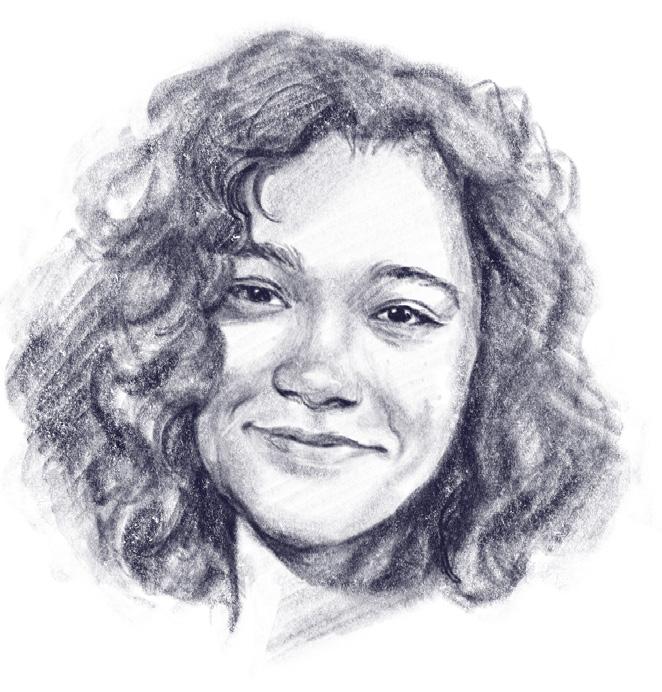
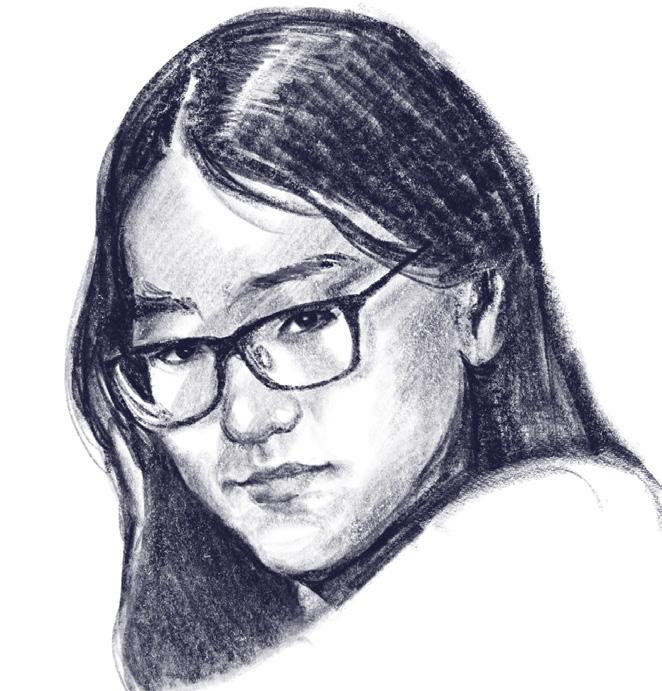
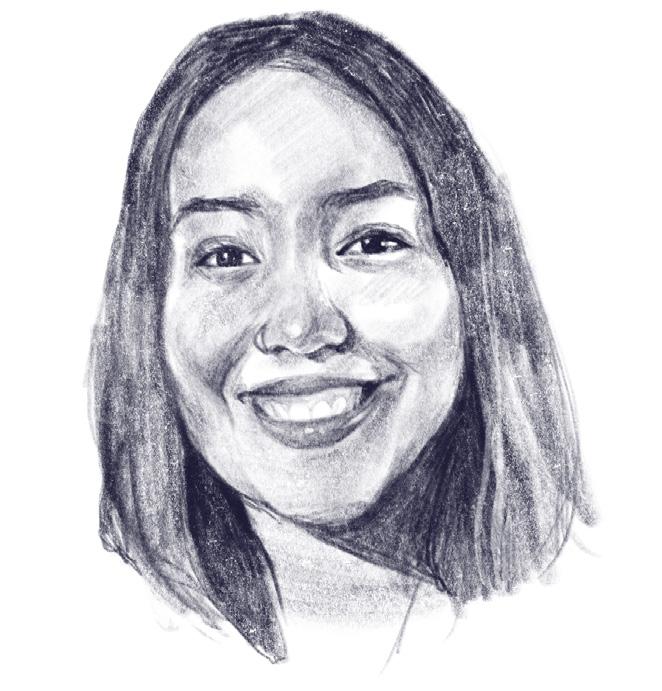









Hey, y’all, Happy first issue of the semester!! I’m so excited to be editor-in-chief (may Andy rest in peace) and I can’t wait for you to see what we have coming. This month’s theme is
Women’s History Month. Here at 22 West Magazine, we’re celebrating the fact that we have an ALL female staff for the first time ever! The team we have is so amazing and they’ve put in so much work, so I really hope you enjoy it. We have poetry, personal stories, and interviews that highlight women’s experiences! If you want to volunteer for the magazine, please contact any of the mag staff :) Find us on the first floor of the USU across from the pool tables if you wanna hang out, volunteer, or just say hi! Go women rah rah rah!

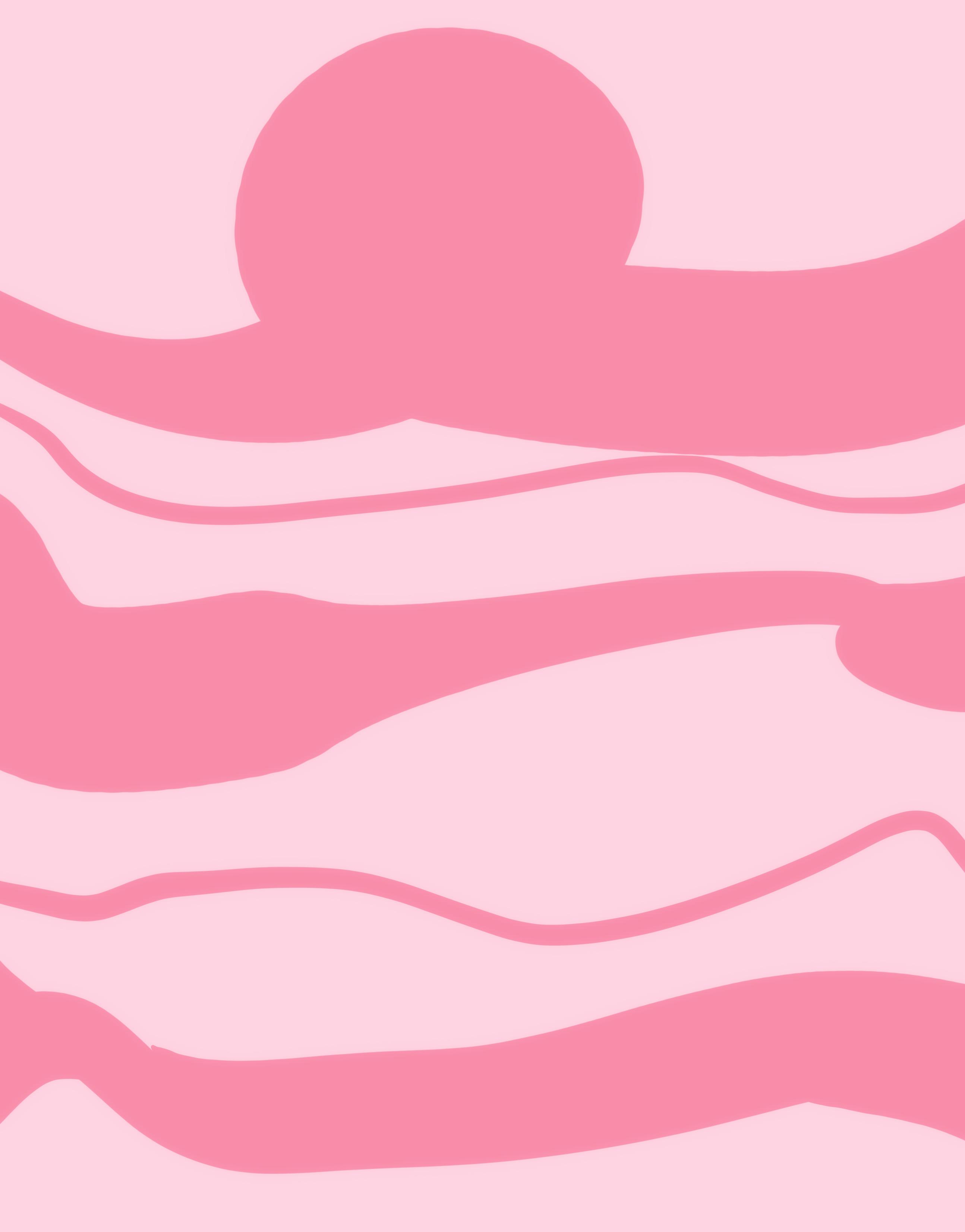
Jensen Puckett, Editor-in-Chief editorinchief@22westmedia.com
Sofia Carlos, Managing Editor managingeditor@22westmedia.com
Natalie Comfort, Lead Copy Editor copyeditor@22westmedia.com
Caroline Bae, Art Director artdirector@22westmedia.com
Kacey Acosta, Advertising Manager advertisingmanager@22westmedia.com
Mia Bishirjian, Distribution Manager distributionmanager@22westmedia.com @nimpancloud
Helen Ho, Illustrator
Meetings every Friday at 2:00 pm on Zoom Contact editorinchief@22westmedia.com or check our bio @22westlb on Instagram
Email: info@22westmedia.com
Mail: 1212 Bellflower Blvd, Suite 108 Long Beach, CA 90815
Disclaimer and Publication Information: 22 West Magazine is published using ad money and partial funding provided by the Associated Students, Inc. All Editorials are the opinions of their individual authors, not the magazine, ASI nor LBSU. All students are welcome and encouraged to be a part of the staff. All letters to the editor will be considered for publication. However, LBSUstudents will have precedence. Please include name and major for all submissions. They are subject to editing and will not be returned. Letters may or may not be edited for grammar, spelling, punctuation, and length. 22 West Magazine will publish anonymous letters, articles, editorials, and illustrations, but must have your name and information attached for our records. Letters to the editor should be no longer than 500 words. 22 West Magazine assumes no responsibility, nor is it liable, for claims of its advertisers. Grievance procedures are available in the Associated Students business office.
The idea that women have a uniform experience is false and misguided. It’s spread by a society that views women’s lives through a narrow lens of perceived inferiority and delicate femininity. In reality, being a woman is a collection of diverse experiences, a multifaceted tapestry that cannot be confined to a single definition or label. Women hail from different countries, cultures, and ethnicities, each thread contributing to the unique fabric of their lives. They face unique challenges and discrimination, shaped by their sexuality, age, faith and more.
Mainstream media perpetuates this myth of a monolithic experience, limiting representation to a few stereotypical roles and reinforcing the notion of a singular circumstance. The media that we consume, like movies and TV shows, play an important part in forming our perceptions of others. Popular culture, for most people, is the primary way we learn about those who are different from us. Diversity and representation of any kind is something that should be celebrated whether it is about race, gender, religion or sexual orientation, but we’ve all probably seen how women are portrayed on these platforms. This takes the shape of characters that fit under tropes that generalize what makes a woman and how they live their lives. It makes its way into popular culture today in the movie, “Don’t Worry Darling.” Even though this film centers around a fake reality, it still highlights a man’s strong desire for women to be trophy wives, doing as their partner pleases and not having a thought of their own - a trope that is overplayed. The reality is women’s experiences
are vast and varied, and their stories deserve to be told in all their multifaceted beauty.
Intersectionality perfectly aligns with the diverse experiences of women and is a framework that acknowledges the way multiple aspects of a person’s identity. This includes race, religion and socio-economic status. It interacts to create unique experiences of privilege and discrimination. This understanding of intersectionality recognizes the multiple layers of advantage and disadvantage that individuals
more complex, shaped by the interplay of multiple forms of oppression. The standard for presenting yourself professionally targets their natural features. Many jobs ban hair that seems “unruly,” which is just another derogatory word to describe Black women’s hair. In 2010, Chastity Jones, a Black woman from Alabama, was offered a job at Catastrophe Management Solutions as a customer service representative (Vox, 2018). The job offer was withdrawn when Jones refused to cut her locs, which the company claimed were messy. In 2013, the Equal Employment Opportunity Commission sued the company on Jones’s behalf, but both the district court and the 11th Circuit Court of Appeals dismissed the case. The combined impact of these intersecting forms of oppression created a unique set of challenges that must be overcome and cannot be fully addressed through a single-axis lens. This emphasizes the importance of understanding a person’s individuality and experiences for creating an inclusive society that supports marginalized groups.
face and highlights the importance of considering multiple identities when examining experiences. This idea is crucial in creating solutions that approach the intersection of multiple forms of oppression. On top of the well-known fact that most women are usually paid less than their male counterparts, the experiences of Black women in the workplace is
Another example of additional identities would be a woman who identifies as LGBTQ+. They often face discrimination because of both their sexual orientation and gender identity, which can lead to social isolation. This can have negative impacts on their mental and physical health, including higher rates of depression and anxiety. Intersectionality is a crucial tool in the fight for gender equality and social justice, as it allows us to understand the complex and nuanced experiences of women and work towards creating solutions that address all aspects of their identity.
“Being a woman is a collection of diverse experiences, a multifaceted tapestry that cannot be confined to a single definition or label.”
As a proud Asian-American who embraces both my queer and non-binary identities, I have a variety of experiences that are shaped by these intricacies. While some may see the labels of “woman” and “non-binary” as contradictory, I view it as a testament to the fact that our experiences are far more nuanced than just two binary gender options. Being non-binary means embracing a fluid sense of gender that isn’t limited to just “man” or “woman”. It’s not a matter of not being able to be one or the other, but rather the recognition that we are so much more than just those two labels.
In addition to embracing my queer identity, I am also aware
ILLUSTRATION BY ABIHAIL ORTEGAof the experiences that come with being an Asian-American in today’s society. I navigate the complexities of cultural identity, confront the reality of racism and prejudice and work to reconcile the multiple aspects of myself in a world that may not always understand or accept me. Yet despite the challenges, I see my intersectional experiences as a source of strength and resilience. It is a reminder that no two people have exactly the same experiences. It’s important to recognize and celebrate the diversity of women’s experiences, including the unique challenges and strengths of this demographic. Being a woman is simply one aspect of a person’s
identity and does not necessarily equate to having shared experiences with other individuals who identify as women. Failing to recognize the diversity of women’s experiences can lead to misunderstandings and reinforce harmful stereotypes. It’s crucial to embrace and cherish the varied experiences and to steer clear of generalizing or oversimplifying their lives. By recognizing the complexities and differences within the group of women, we can cultivate a more inclusive world, where every individual is honored and valued for their unique journey.


When Alyssa Esparza sits down, the first thing she does is tie up her hair.
She uses a band to secure her brown strands into a ponytail, leaving behind a few loose hairs to frame her face. It’s a style that she replicates in her lectures, labs, and American Society of Civil Engineers (ASCE) meetings. She’s one of the few in her classes that sports this look- because in most of her classes, she’s one of the few women in the room.
As she gets comfortable, Esparza taps her fingers against her legs. She’s donned a bright blue sweater with some casual black pants and sneakers. Nothing too fancy for a Saturday on campus. She’s here for an ASCE meeting, an organization that performs community services and focuses on getting students into careers in the civil engineering field.
Ezparza is a second-year civil engineering major at Long Beach State- a major that is currently dominated by men. According to the Zippa: The Career Expert website: 83.6% of civil engineers in the United States are men. Only 16.4% are women.
“It’s kind of a scary statistic to be honest,” Esparza said. “You hear it’s really that bad, but you don’t think it’s really that bad.”
Esparza laughs as she says it, but deep down, it’s not really a joke. Women in STEM have historically been the minority; even though some majors, like kinesiology and animal science, are seeing a significant change in becoming female-dominated, there are still plenty of majors that find men to be the majority- including engineering.
As Esparza talks, she recalls an experience that she had in a class freshman year. In a class of 20 students, Esparza was the only woman.
“The doorway to get into the class had the men’s restroom sign over it,” Esparza said. “They were like ‘Is she allowed to come in here?’ - it was so bad. I was
the only girl in the class in total, they made it super clear, they pointed it out a lot.”
Experiences like these shape the college experience for women in male-dominated majors. Esparza describes a few different stories of times that she’s been singled out as a female student in the class-
vating.”
She tells about how her STEM friends help her through tough times in classes. In Esparaza’s life, women support each other by giving reminders about upcoming assignments and sitting together in classes. She explains that having a “fellow woman” in her classes provides comfort to her.
The bright side is that there has been an increase in females in the civil engineering field. According to the Cambridge Occupational Analysts, from 2007 to 2014, there was a 16% increase of women in the field. This is good news for the future of engineering and the little girls currently out in the world that are hoping to join the field.
“It’s important to talk about,” said Esparza when asked about the conversation around women in engineering. “I don’t know how much I have to offer towards it, but it’s super important.”
room: the surveying equipment being too tall for her because her lab partners were all male, never seeing the name of a female engineer being taught in a classroom, and conversing with an argumentative classmate about which direction north is in (spoiler alert: he was wrong).
“You feel singled out sometimes,” Esparza explains. “You feel like you shouldn’t be there.”
But it’s not all negatives in the engineering field for women. A lot of these experiences are what help women in STEM fields form connections. The bond that female students form by sharing their lived experiences creates a sense of camaraderie within the community. That feeling of being singled out that Esparza talks about goes away when she’s with her female friends.
“You realize that you’re all going through the same thing,” said Esparza. “When you know that other people are in the same boat it makes it more moti-
One of the organizations on campus that focuses on this conservation is the LBSU chapter of the Society of Women Engineers. This organization not only provides students with a safe space for female engineers to connect with each other, but also helps female engineers in the field find careers. It promotes career opportunities for women to create diversity in the field.
Starting the conversation is what brings awareness to the gender inequality present in the field. So that next time when another woman walks into class, maybe the surveying equipment is the right height and there’s no argumentative classmates questioning her on directions.
Esparza walks out of the building and heads down the stairs towards lower campus to her day of ASCE meetings. She tightens her ponytail one last time, preparing herself for a day of hard work.
“The bond that female students form by sharing their lived experiences creates a sense of camaraderie within the community.”BY NATALIE COMFORT FEATURE
Courtney Leos is a program assistant who is going on her third year of working at the Women’s and Gender Equity Center, a resource center located on the second floor of the Student Success Center. I sat down with her to talk about the center’s purpose, resources, events and her own personal experiences as a doula.

Natalie Comfort: Tell me about the Women’s and Gender Equity Center and what you do here.
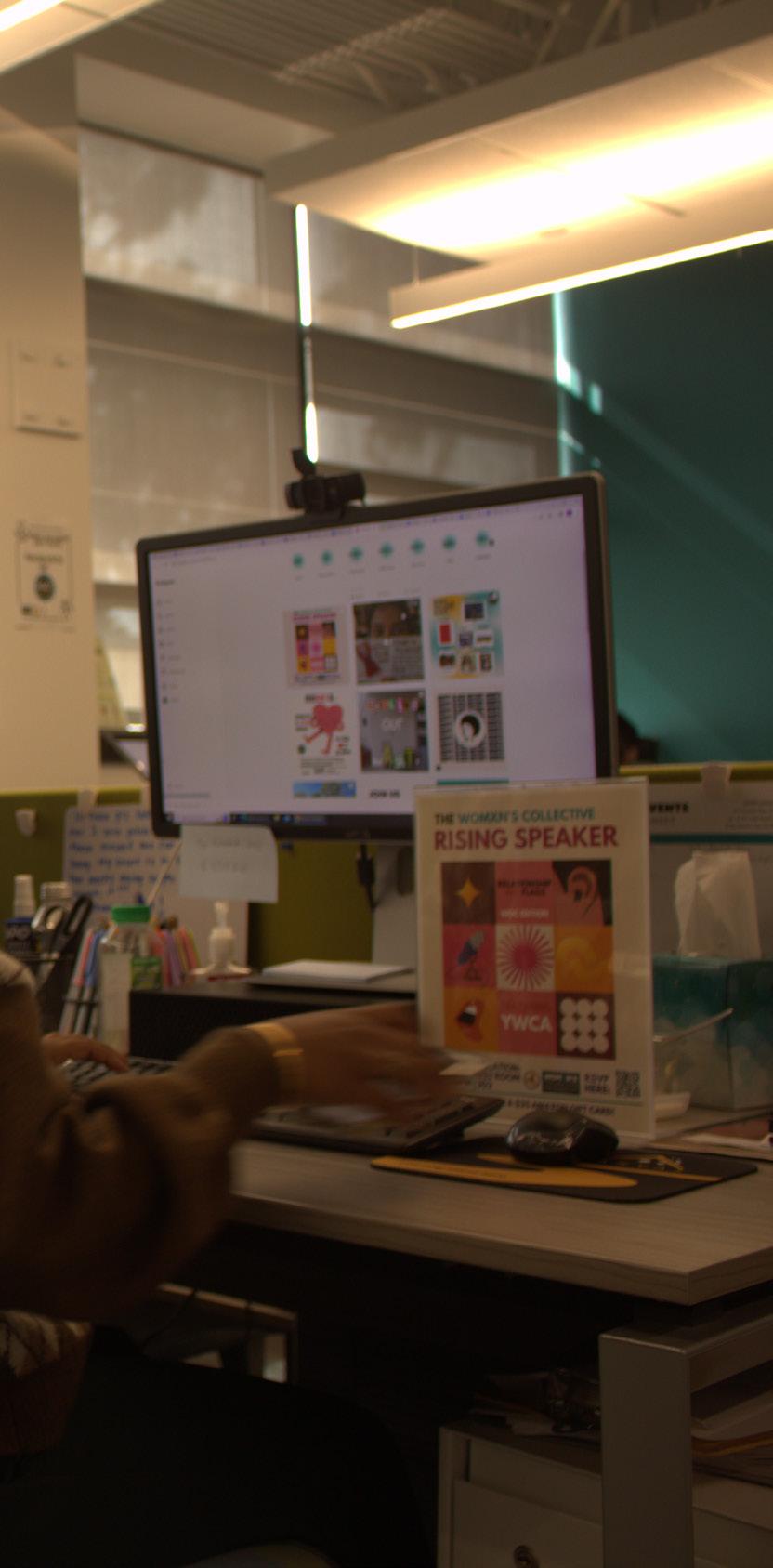
Courtney Leos: We are under the Division of Student Affairs. The center is a place to build community. We have events. We also are considered a resource center: we have the computer labs, printing, a fridge, a microwave, snacks and the lend-and-learn library. You can come in here: it’s whatever vibe you are looking for. You can come in, hang out and play games, you can come in here and do homework. I’ve done classes here.
We also host events and programs pretty often. They are rooted in our four values: advocacy, community building, education, and self-empowerment. For me, this is my first year working on campus; the other two years were virtual. It’s really a place to build community and meet new people. For events, we have the Women’s Collective; they hold events every month. We have the Heart-to-Heart; we have the Rising Speaker Series; those are community-building events for women of color on campus. Other campus organizations will meet here as well. We also hold space for pregnant and parenting students, so we have programs for that. There is a breast milk fridge.
NC: That’s so helpful.
CL: Right.
NC: That’s awesome. I know you were in charge of the menstrual product drive, what was one of your favorite events and the impact that it had?
CL: Last year, one of our program assistants, Anjali, did a Healing our Hearts program. It was a collage and journaling event. It was so much fun. There were a bunch of people I didn’t know. We all sat together and were talking, just ripping out our pages, making our collage. It was a good community-building exercise and a way to destress during midterms or finals. It stuck with me so I have so many collage journals now. I loved the menstrual product drive because the campus community really came together. It was during a time when I was in shambles, early in the semester, and it was just so fulfilling to see the impact. We worked hard on that.
We had two events around reproductive justice. One
was with Dr. Loretta Ross, one of the pioneers of reproductive justice, so that was amazing. We had another one, an abortion teaching, about the Texas abortion restrictions at the time. This was before Roe v. Wade got overturned. That was probably the most collaborative event I had worked on. We had professors from the Women, Gender, and Sexuality Studies department and everyone came together and made something happen. It was very educational. Right now, I am working on programs for April, which is sexual assault awareness month.
NC: On a daily basis, what’s the primary reason you see students coming in?
CL: It’s a nice space to be in. You can do your homework; there are tables so you can just hang out. We have a lot of students that will come in pretty often. You get to learn more about them. The Women’s Collective hosted a movie night in November. We were all sitting in the office watching the movie, eating snacks, and it was so cute.
Everyone thinks that this is just the women’s center, but it is Women’s and Gender Equity Center, so anyone
is welcome to come here. I emphasize that since we do events that are gender-inclusive and accessible to everyone. We just make it so everyone feels welcome. But yeah, a lot of people don’t know that we are here, and that we have the things that we have access to. Something that helps is that one of the WGSS 101 classes did a scavenger hunt last year and all 40 of their students had to come through here. We want everyone to know that we are here and what we offer.
“Everyone thinks that this is just the women’s center, but it is Women’s and Gender Equity Center, so anyone is welcome to come here.”FEATURE BY NATALIE COMFORT
NC: Can I ask how you became a doula? It’s unique in comparison to midwives, you are really with them throughout the whole process, more so than doctors.
CL: Oh yeah, for sure. I had a job in sex education. I was a social media and community manager for a digital sex education platform. I’ve been curious about pregnancy and labor and delivery. I’ve been an auntie since I was 11 or 12; I’ve been around kids my whole life. I have a bunch of younger cousins. I was in the room when they popped my older sister’s water before. I didn’t know what was going to happen, since I’d only seen it in the movies. So when it wasn’t just water… I was like… wait what just happened. I remember being fascinated with the changes in my sister’s body when she was pregnant. I knew I wanted to go into health education.
Then I learned about reproductive justice and how
CL: So, we are all required to create one program a semester so you curate your program. You get your budget; you plan it; you get what you need; you reserve a space; you make the flyer; you post the flyer; you spread the word and then you host your event. It’s really exciting, and we support each other in the office.
NC: That’s great everyone wants to add onto each other.
CL: Another cool thing is that all the student assistants have different backgrounds, majors and areas of expertise. But with each event we all come together and make magic. My major is WGSS so a lot of my events are around gender equity, reproductive justice, and content around those lines. But I am also a doula, so I’ve done events for pregnant and parenting
pregnancies are not an easy thing. It can be super traumatic. I think everyone should have an empowering birthing experience. I have kind of put it on pause because I don’t intend to make money from it. I just want to give everyone an opportunity to have an empowering labor and delivery experience. Having a child is such a big thing. It looks different for everybody, but it should be special and you shouldn’t have to worry about basic things going wrong. Like you said, some doctors just come in to deliver the baby and that’s it.
NC: They are not always a part of the whole process: physically, emotionally, all these different elements.
NC: So your specific role is a program assistant, can you explain what that means? Do you focus mainly on organizing events?
students. There are a lot of personalities and different interests, but everybody works together. Even when you have your event, you are always supported by others.
NC: All these events get to build a community that you wouldn’t necessarily have. They have clubs and organizations for your major, but not always for everyone.
CL: Yes, coming out of COVID-19, that was so important. If I would have graduated when I was supposed to last year, I wouldn’t have had these in-person experiences.
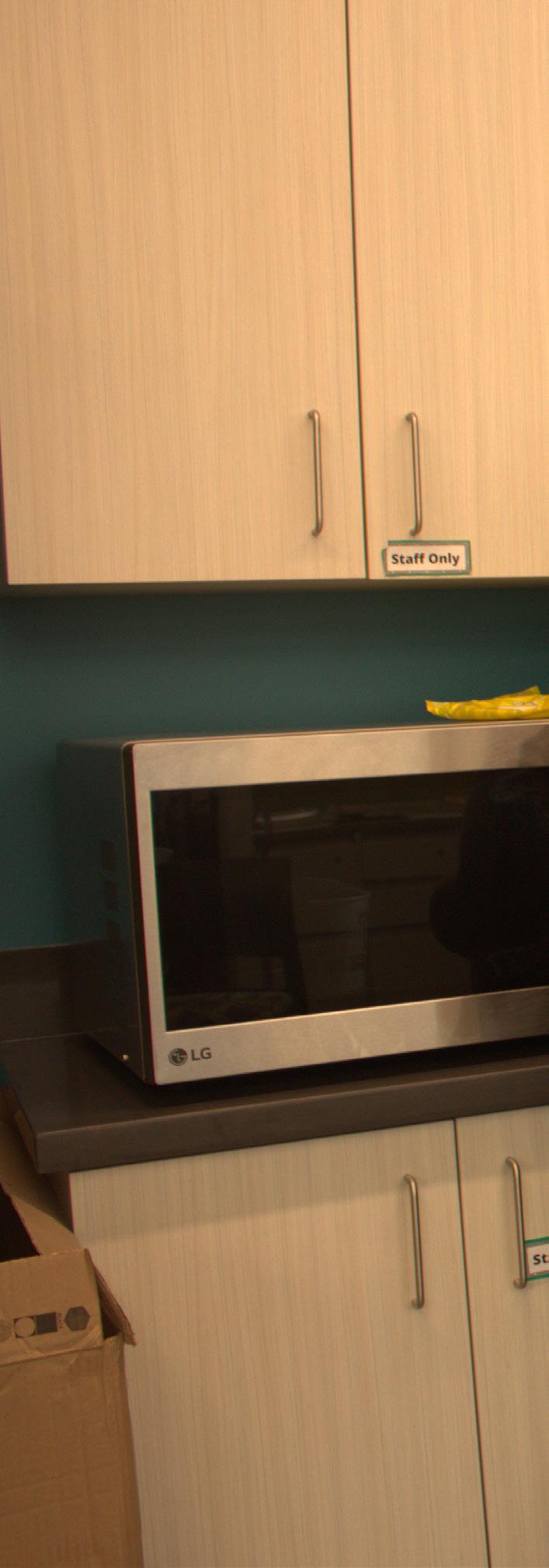
NC: A new opportunity you didn’t foresee.
CL: I am so happy I did that.
“ Another cool thing is that all the student assistants have different backgrounds, majors and areas of expertise.”
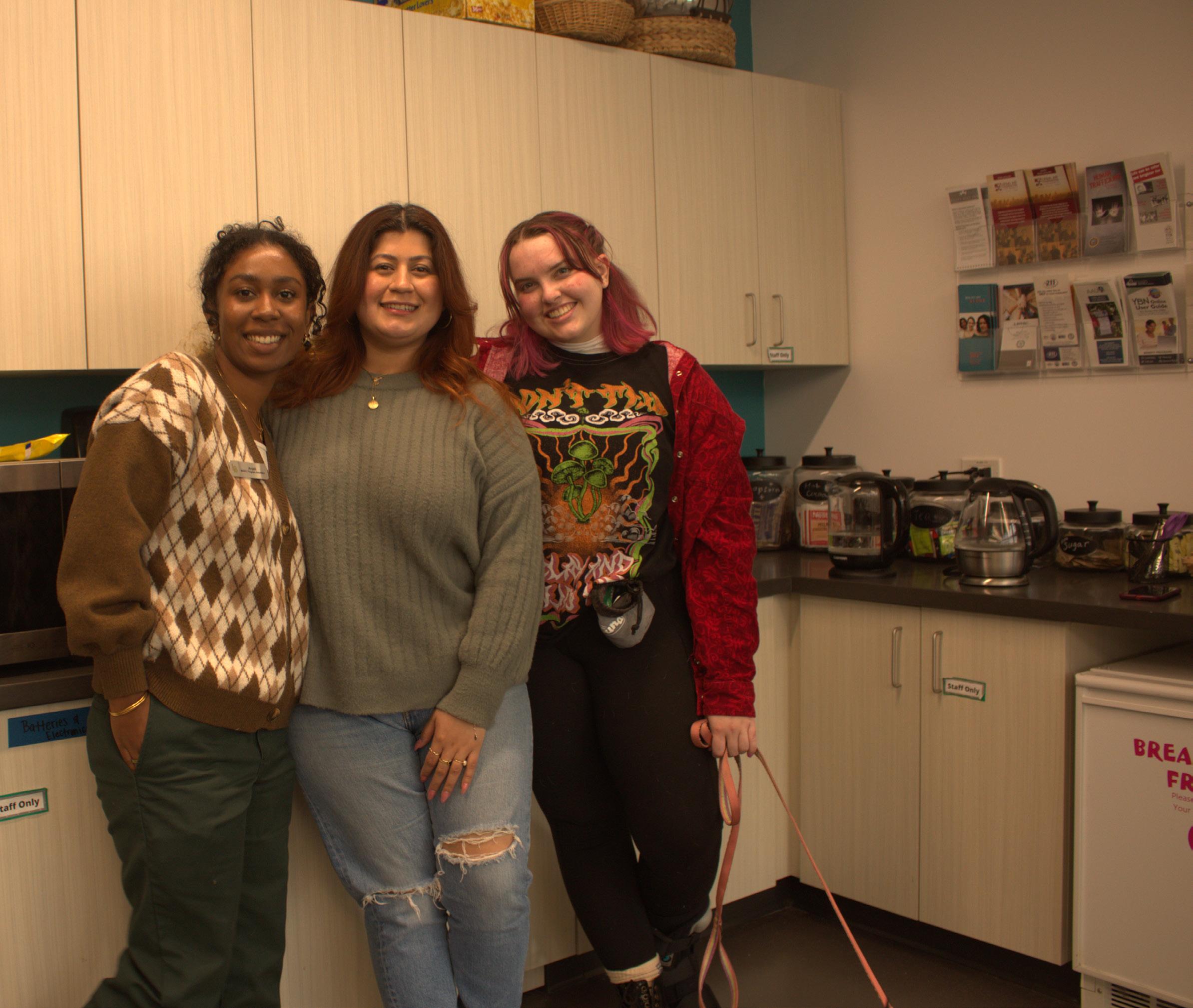

Being born a woman and realizing 18 years into your life that you aren’t one is jarring, to say the least.
It was a lot of confusion, anger and sadness balled up into one, and it began brewing amidst the beginning of a global pandemic. Having to dissect who I was, what my gender was and why I even had to have one in the first place was a battle I had with myself daily.
I fed into stereotypes and gender norms when I was trying to figure all of this out. I assumed that I must be a man since I wasn’t a woman, but calling myself a man didn’t feel right. I figured that because I might be a man I had to quickly gather up a gaggle of boys to call my friends and distance myself from the deep friendships I had with the women in my life.
This all sounds like bullshit, right? That’s because it is. However, it is hard to distance yourself from said bullshit when it’s all you know. We were all born in a world that centers a gender binary. Whether you were raised within it does not matter, because the real world reminds us of it and enforces it every day.
I have never felt as if I fit into the binary, therefore I identify as non-binary. I know most (cis) people think this is a buzzword, but it is a real, legitimate identity (synonymous with sexy and cool). The ‘X’ on my drivers license denotes this, but I would be valid whether it was there or not.
In tandem with this label, I am also transmasculine. This means that while I do not identify as a man, I identify and align myself most with masculinity. I dress masculine; I’ve been letting the hair above my lip grow out, and I have taken up weightlifting to try to broaden my shoulders. I enjoy looking like someone’s big brother in a teen 2000’s movie but just with a softer face and an almost ambiguous voice. I confuse people, and I enjoy it immensely.
However, I do not confuse everyone. Since beginning my social transition, along with my slight physical one, I find that when people do categorize me in their head, I am seen as a man at least 75% of the time. As much as I would love for people to see me as non-binary, I know this is not possible. Since I present masculine, I don’t mind this categorization.
The locations and scenarios for which I have been
seen as a man vary widely. In line at the grocery store, an older woman dropped something and I picked it up for her. She smiled and said, “Thank you, young man.”
At my old bagel spot, the guy behind the counter called me boss and gave me fist bump every time I was in. In the bathroom at a club, my friends and I gave a stranger the “you’re too good for him” talk and she looked at me like I was insane. Maybe she found it odd a man was telling her how shit men can be. Maybe I enjoy being an oddity to people.
Where my enjoyment of this subsides is the realization I had once I began to pass for a man.
The first 18 years of my life were spent identifying and presenting as a woman. In turn, I experienced what all women do as they grow up and go through the phases of their life. I was catcalled and belittled
a white man, the floor is essentially mine. My words are now thought-provoking, as opposed to something we can “circle back to later”.
As a man, my body is no longer a spectacle. When I am binding my chest and my one-size-too-big clothes drape over my body a certain way, I look… like a dude. When I am physically unable to bind my chest anymore and it protrudes out more than usual is when I feel eyes on me again. Anyone who has ever been leered at knows what having eyes on your body feels like. For me, when those eyes belong to a man who just a few days prior was conversing with me like a “bro,” I feel as if I want to let the air out of someone’s tires.
The old men who come into my work no longer call me “honey” or “sweetie.” They call me “boss.” It does not take me getting up from my chair and showing them my height to assert my power over them. They simply leave me alone and treat me with respect. When I wear earrings is apparently when I morph back into a woman, because the same men who want to fraternize with me one day find themselves looking me up and down the next, attempting to visually take in whatever part of me they can have.
by men. I was made to feel as if my words and my thoughts were worth less than my male peers. I was supposed to make myself small so that they would feel bigger than me.
The key words here are “supposed to”, because I didn’t do any of that shit. I got into verbal fights with people over politics, human rights and the horrible language that was used on my middle and high school campus. To everyone I was the mean, scary lesbian. I still stand by this label because lesbians are the coolest, and sometimes you have to be “scary and mean” to get by.
This is why my transition and passing as a man has been so jarring. The same men who I can guarantee would have been my opposition in middle and high school are now listening intently to what I have to say. When I was a woman, group conversation was my adversary, but now that I am seen as a man, especially
I wish I could sum up all of these thoughts and feelings in a way that resembles a conclusion. If I could put my resentment towards having to live through this to rest, then I would in a heartbeat. It feels impossible, though. Nothing stokes my anger like my life having to revolve around the way people will perceive me and my gender. This anger is offset, however, by the life that I lead.
My life is one that centers women. A life without women is one that I could not continue. The solidarity with women in my own life, the women in media and literature whose words I cry to and the women who I am crossing paths with for the first time is unfathomable. I can cry in front of them and dance until my lungs give out. I also consider myself lucky to fall in love with them. Being loved by women and loving them in return is something I am so privileged to experience, because they have been my biggest allies since I began my transition.
With women, I’ve never had to work for their acceptance. I am simply allowed to be.
“The same men who want to fraternize with me one day find themselves looking me up and down the next.”BY ARIEL SMITH CREATIVE


I was raised on the promise of Wednesdays. On the promise of soccer stadiums half-filled, with poor attendance and commentators who notice a ponytail before a hat-trick. On the promise of girl push-ups instead of real push-ups. I was raised on the promise that passion has a time and a place, but no place, in a woman’s vocabulary. Raising little girls on familiarities, and the idea that scraps are comfortable.
At my brother’s wedding, the officiant told my Sister-in-Law, between vows and tears, to become submissive to my brother for the benefit of their marriage. After my brother admitted to never feeling whole without her, the officiant spoke of what a marriage should look like. The words never slipped past his tongue, but I, a woman, filled in the blank space between his cracked teeth: unequal. It should look unequal.
I was not raised on the promise of a better tomorrow or on the promise that Friday is always a few days away, but instead on the promise that as surely as Friday comes, Wednesday comes too. That sometimes the tomorrow you’re promised isn’t glorious. It isn’t even dramatic, it simply is, and if you, a woman, aren’t there for it, what work would ever get done?
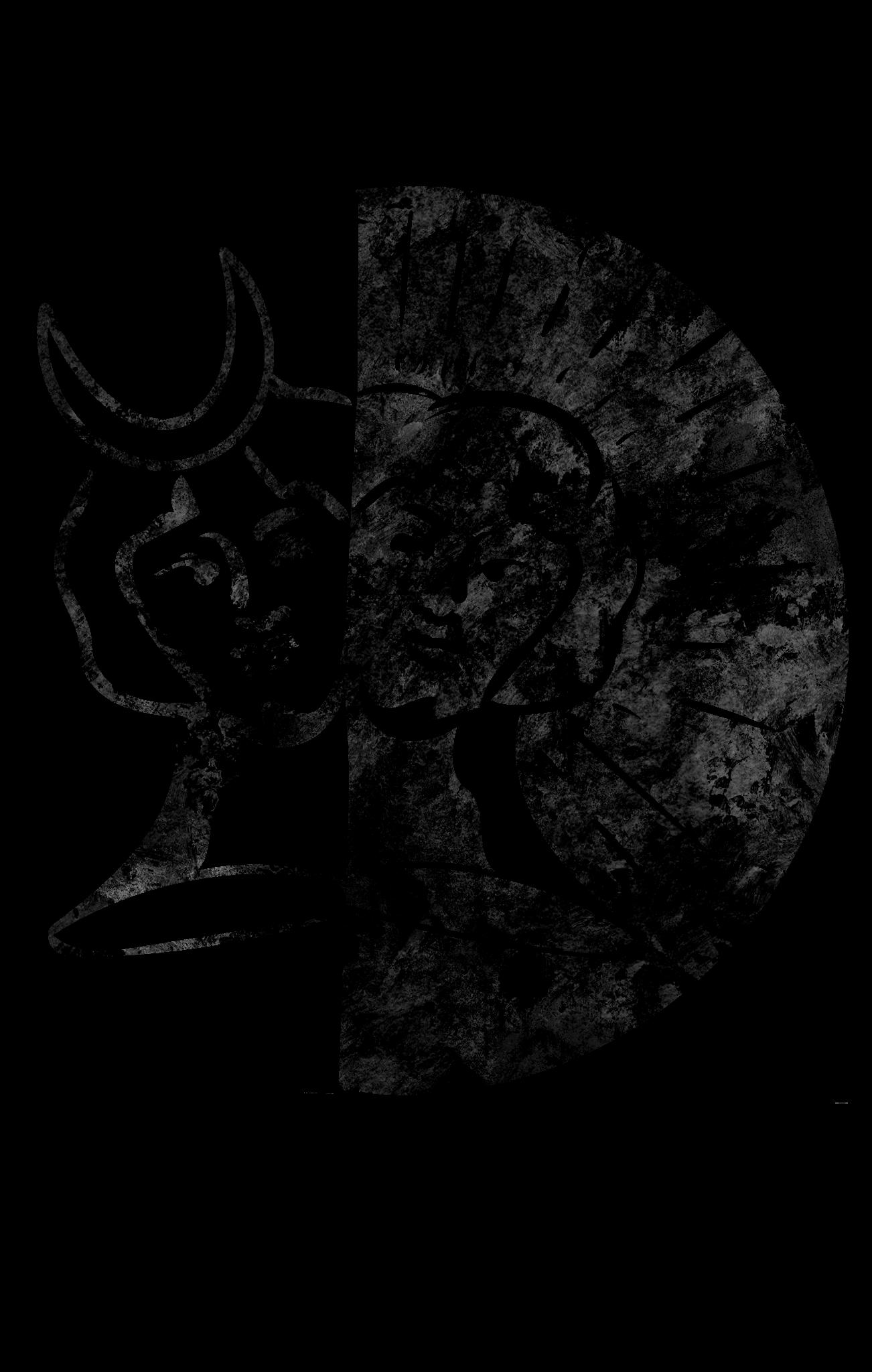

You know, there’s been a lot of new-wave misogynists that have been saying that being a woman is easy. That we’re living life “on easy mode.” Which, with all due sympathy to the tortured men in the world, I would like to contest. I mean, it’s only an entire patriarchal system over society that purveys every facet of a woman’s daily life. But no, you know what, let’s hear them out and define once and for all: Is being a woman actually really easy?
I mean when we’re younger, it’s, “Can a big strong boy help me carry these chairs?” Or there’s the day when the boys all get to learn how they are going to grow big and tall and the girls are sat down to be told that they must pay for the original sin with their own bodily pain once a month, and there is nothing they can do about it. Their blood will only stop flowing when they are pregnant, run out the clock or put themselves through medical or hormonal treatments. Slowly girls are initiated into early womanhood and their bled-through pants are a marker for shame, their loss of pure youth and innocence. The effects for each vary widely. Some girls have emotional highs and lows they can’t seem to warrant, others feel sick and throw up, or they feel that invisible arrow pierced through their abdomen that cannot be pulled out. It’s not like it’s hard to explain to your 7th grade P.E. teacher that you are in too much physical pain to run the mile. He is just going to say that running will make you feel better.
But yeah, life is on “easy-mode” when it’s all nail polish, makeup and sleepovers. However, when you are in that beauty section of the store, the pink razor costs more than the blue one. The pads and tampons, the stuff you need to function for 12 weeks out of the year, cost way more than they should. Every lotion, salve, cream, conditioner, curler and product is advertised to make you beautiful and ageless. Makeup is necessary to look presentable. As a woman, beauty is necessary to be acceptable.
At our young age, we become objects. Something for men to look at, admire and want. All of a sudden we graduate from one-piece swimsuits to bikinis. Your body was once yours. The vehicle of your identity. Now it is a weapon that you must keep sheathed and learn to control. If you don’t, it could mean your own destruction. Strange men countdown to young celebrity girls’ 18th birthdays, so it can be publicly accepted to ogle them. Hey, if they date Dicaprio then they are set until their 26th birthday, right?
You watch as a bunch of female celebrities get whatever new plastic surgery trend is taking Hollywood to remain youthful as possible. There’s just a publicly accepted notion that aging in women is unwanted. A woman over forty is old news, and we move on to the next young thing to prize. Jennifer Coolidge and Michelle Yeoh are welcomed exceptions to the Hollywood Youth Vacuum, but being an exception means that the system is still too strong to overcome it. Even the youths, like Bella Ramsey, are endlessly criticized because they do not match the perfect image misogynists have imagined.
You begin to notice it, when someone like Taylor Swift is dragged for writing too many songs about her ex-boyfriends. That she must really struggle to keep them. But her contemporaries are praised when they sing about all the “bitches” they get. The double-standard is so normalized sometimes it’s hard to identify, but when you realize it’s there– it is everywhere.
Of course too, the women you see on the screen are the ones being saved, morally pure or heinously evil. The beautiful, often cis, thin, white woman is the object of desire. Too often, the exception is a monstrous villain. Her refusal to conform makes her unwanted and disdained. The man is the hero; the man can be dark and tortured. The woman ends a story either dead or married.
We notice it more when we get older too. A tragic man’s story leads to him hurting people. His emotions
make him so sick and twisted and his misery is justification for violence. But a tragic woman wallows in her suffering and, almost inevitably, ends her story tragically dead.
And you know, when you are in a class, you get used to being talked over so much that you’ll stay quiet until you have something truly solid to say, if that. Meanwhile, the men in the class will happily drone on for ten minutes repeating something a woman just said. Even then, you have to be so ahead of the curve to be respected– smart and well-mannered.
Your personality, from an early age, is perfectly crafted to be performed and perceived. We must acknowledge that we are judged quickly. You do not want to be “like other girls” because that means you are susceptible to judgment for being too girly and feminine. It’s this impossible, complicated line you try to balance in order to simply function and control how you are perceived.
Your existence is also an open invitation for men to approach you with the, “You got a man?” question, and regardless of your answer, they are persistent in making an uncomfortable situation.
In relationships, the woman is the caretaker. She’s there to fix a broken man. In many women’s relationships, there’s a power imbalance. Many of us try our best to avoid the dead-ended fate of being stuck in a controlling relationship. We have all heard of or known of women who are told what to wear, who to hang out with and, of course, the entirely possible fate of being abused or victimized.
And you know, women are constantly threatened, stalked, brutalized and going missing, so much so that it’s hardly in the news and practically normalized. Women of color and queer women even more so. But it’s easy to accept that. Just carry some pepper spray with you and you can peacefully walk at night.
But actually, it is pretty easy. I do it all the time.
I just try to feel sexy. When I look at the mirror, all I see is a giant grotesque gorging pimple on my belly ready to explode.
The white greasy puss of butter
Instead of veggies barely holding its stature from the turkey leg— scratch that— the whole fucking turkey.
So let me try to feel sexy in my seat, let my confidence awaken at its peak. But I must cover my chest while I’m at it. Don’t wear so much, but don’t wear too little.
Let them wander from what could be underneath.
But let them see so they can get a glimpse. Prissy Prudy Trudy is not what I want to be known for. But only a second,
otherwise you’re a whore with a pimple on its belly.
Whorey Tory is not what I want to be known for either.
Wake up at 5am, grease, wash, and shampoo the frizzes.
I have to straighten my hair if it becomes an issue. Matter of fact, wear a weave. No one wants to see it nappy.
Nails must be done, not too long, not too short.
Baby pink, not red, not an absurd color of oddness
Don’t wear makeup unless you’re ugly
Rip every piece of hair off my body except from my head
Keep that long to pull and to twirl.
Never dye your hair unless it looks boring.
Blondes have more fun, but don’t buy the dye at CVS or Walgreens.
Smile with your teeth unless they’re crooked.
Drink a beer at a party, but nothing more. Always be with a friend. Put a hand over your cup.
And I don’t dance with strangers.

It’s my fault if something bad happens, so I won’t blame others when I inevitably take another cup of beer, If I leave my friend, and a boy touches my ass.
Don’t eat bacon
Instead, eat your maple muck of misery
Take your role in life and stand in line for your death sentence.
Okay. I think I’m ready to leave. Bag–check, water bottle– check, pepper spray– check, wallet– check, SOS alarm– check. Okay, I should be good to go now. That’s a list I find myself mentally going over every time I’m about to leave the house. Guess what? So many women have to go over lists like this every day. Find anything odd about the list? Many will relate, but for those that don’t, pepper spray and an SOS alarm are only two of the many, many self-defense tools bought by women. Imagine having to worry about self-defense and being prepared for the worst on top of the pre-existing worries women face for merely existing in a world full of misogynists, predators and outright vicious individuals. Sounds charming.

As a college student and a woman, I’ve had to develop a hyper-awareness of my surroundings. This type of skill has been adopted and instilled into girls and women early on in life. Growing up, I remember always seeing my mom’s pink pepper spray on her keychain. She eventually bought me a set of my own self-defense tools as I started going out more frequently. Constant worries include: walking to my car or through a parking lot at night, being aware of those around me so I notice if I’m being followed, reading a room and observing body language, etc. It’s saddening to realize that we live in a world where these things need to remain in the back of our minds out of pure survival.
In a college setting, women (students, faculty, and staff) are more prone to being approached by predators and often fall victim to sexual harassment. I would not only like to highlight the dangers female students face but will include female faculty and staff. Yes, harassment happens routinely outside of academic institutions, but there is concrete evidence that
supports the statistic that, “percentages of women who experience harassment in different workplaces have found higher levels (58%) of harassment in academic settings than in government (43%) or private (46%) settings” (Dwight Krehbiel). Schools may attempt to aid students facing any sort of harassment or “misconduct”, but their idea of “prevention” comes in the form of Title IX training which only provides information instead of working towards any legitimate action-based prevention.
In an article written by Dwight Krehbiel, a Professor at Bethel College, he explores the reasons why sexual harassment has a high rate in academic institutions. Krehbiel wrote, “A core factor in these high harassment rates is that academic environments have commonly been tolerant of harassment, i.e., perpetrators have tended not to experience negative consequences for their harassing behaviors.” Although there are a growing number of women working in these institutions, schools often overlook what happens to the women in faculty and staff positions as they work in a male-dominated environment daily. It’s crucial to take into account the numerous women who have been minimized and overlooked in the workplace by corrupt institutions. Otherwise, what chance do students have if the root of harassment in schools, on account of perverse transgressors, isn’t eradicated?
Looking further into what the student body has to say about overall safety and sexual harassment, I stumbled upon an online petition some of you may or may not have seen. This petition was started by an anonymous LBSU student four months ago on change.org. Reading the contents of what this student wrote left me in a state of anger toward perpetrators of harassment at LBSU. I gladly signed and hope that
this article might give the petition a greater platform. Here’s where we get deeper into the cause of harassment specifically at LBSU.
To paraphrase what was written on this petition, harassment occurs in several departments at school, no surprise there, but we’re calling out the College of Engineering in particular. It is apparently something that occurs daily in this department and little is being done to stop it. Quoting the anonymous student, “I know victims who have been followed from campus to
quences on account of abusers who face none? School should be a place to focus on studies, get a proper education and interact with friends. It should not be a place to dread coming to. It shouldn’t be a place where you need to stay vigilant to avoid harassment due to certain individuals.
Going back to what the anonymous student stated, “Not to mention ASI, . . . the student government positions that get paid tens of thousands annually in ‘scholarship money’ for their job to help people. One student proposed to ASI’s president to have an anonymous google form (one link per email) to allow victims to share their experiences. The responses would then be used to help develop a plan to promote safety. . . The president agreed but never acted on this proposal. Not even an update.”
their homes. I know victims who have had to quit their clubs because of their experiences with fellow club members. I know victims who experienced emotional abuse because the harasser could not take NO for an answer. . . Some victims have reported it. Others are too afraid to because they fear for their safety and have learned the campus does not take safety as seriously as they claim to.”
Not to say that any amount of harassment is ever okay, but if harassment is getting so bad, why isn’t LBSU doing anything about it? Students are missing class as a result of abuse and are taking the brunt of the aftermath by not receiving the education they deserve. Why are innocent students facing conse-
It sickens me to know that those chosen to represent us and create a better school environment are doing little to nothing to help those struggling with continuous harassment. Placing all trust in those with higher positions doesn’t mean things get better. It makes matters worse when those with power willingly decide to do little, knowing there are currently victims struggling and assailants thriving at school every day.
We cannot rely on corrupt individuals to solve our problems. No one deserves to be minimized and treated with abuse. And LBSU, please do better.
“It’s saddening to realize that we live in a world where these things need to remain in the back of our minds out of pure survival.”BY SCOTT CARSO
In this interview, I spoke with Rae, a territory manager for Engineered Sealing Solutions. Rae was raised in Long Beach by a single mother, struggled to start her own career path after graduating highschool pregnant, did not complete a university degree, and happened to find work in the field of mechanical seals for pumps over 15 years ago. Rae’s words highlight the adversity she has faced in a male-dominated field.
Scott Carso: What are some of the challenges you have faced working in an industrial, male-dominated field?
Rae: I never fit the part; I used to be cute and blonde and was commonly being invalidated because of that. I also did not have a degree; some people would use that as a reason to not interact with me or give me the respect I deserved. I had specialized technical knowledge and experience from working in the industry for so long. I was either viewed as dumb and not qualified, or I was sexualized and would have customers buy everything I was selling not because they wanted the product but because they wanted me. This led me to develop thick skin, so I can hang with the rest of them. Being constantly overlooked and invalidated made me become unsure of myself.
But one thing that I never lost confidence in was my work. I didn’t have the educational background to assert myself so I made sure to learn through experience. I earned confidence through experience because I worked so hard just to maintain my role. I think today there are more women of inspiration in technical male-dominated fields; I didn’t really have that when I was younger. My mother raised me, and she always worked really hard. That’s one inspiration for my work ethic and drive, I overcame hurdles and life’s challenges just as she did.
SC: You mentioned your mother raised you. It sounds like she was a real inspiration, did you have any siblings?
R: There were four of us.
SC: Did your mom work? How was she able to support all of you?
R: She did work; she always made sure us kids were taken care of. We relied on government assistance; we were in poverty, in the projects, but they were really nice projects though. In her late 20s, my mom decided to make it happen, to grow for herself and for her family. She enrolled at Long Beach Community College to pursue nursing while working two jobs and being a single parent of four children. After that, life wasn’t easy but at least she had money in her pocket and didn’t have to depend on anyone to take care of us. Her first job as a nurse was at Long Beach Memorial. I still remember when she found out she got the job she went out and bought a 55-inch box TV and a brand new car, which turned out to be a total lemon but then she got a different new car.
SC: You touched on how you felt you didn’t have many celebrity role models to look up to, were there any people who you knew personally that professionally inspired you besides your mom?
R: Yes, I had a mentor, about 15 years ago, who was my boss at the time. She was a people-person, very appeasing, smart, put-together, lit up the room and commanded attention. I also had an additional supervisor, about 10 years ago, who was in the seal industry; she was driven, very business-oriented, but still cared. If she didn’t know something she would say that but she would also find out.
SC: Were there any role models that you had early in your career or growing up that you didn’t personally know?
R: Not really, I never idealized or romanticized celebrities. My role models were people I had an interpersonal relationship with. I never thought I’d be doing this for a living; this isn’t a young girl’s dream. But, my passion for helping others has allowed me to become successful professionally.
“I was either viewed as dumb and not qualified, or I was sexualized and would have customers buy everything I was selling not because they wanted the product but because they wanted me.”

Though this is the Women’s History Month issue, we wanted to include the online Black History Month articles we planned to have. Due to technical difficulties, we are unable to update our website at this time, but we wanted to celebrate Black History Month and spotlight Black voices and artists. We start the Spring semester too late to be able to print an issue, but in the future, we will be able to make an online issue work on our website. Thank you so much to those who contributed and also to you all for reading our content!
Igrew up in a diverse family. Nearly half of my family on my father’s side are in interracial marriages. As I was growing up from a toddler to a young adult, I’ve been surrounded by a variety of languages, cultures, and traditions. As someone who is of primarily African, Mexican, European, and Native American descent, I appear pretty ethnically ambiguous. For some reason unbeknownst to me, I notice a small subset of the population tends to view this as an invitation to either assume, take an unusual amount of interest or expect a disclaimer about my ethnicity. I’m writing this article to argue that basic social rules around conversation and prying into strangers’ lives still stand and should be treated with more reverence than they currently are.
I mean, would you show up half an hour late to meet your friend? Or randomly start eating someone’s food out of their fridge with no invitation? Ask someone how much money they make within the first 10 minutes of meeting them? Probably not. These social rules are basic. They are so well-understood because they all stem from the desire to not make others feel uncomfortable or intruded upon. Conversational social rules are also there for the same reason. I don’t think any of that should fly out the window, simply because one is asking about your ethnicity instead of your job.
It’s one situation to ask someone about their ethnicity/culture if you believe you might share that in common. However, it’s an entirely different situation to play a socially inappropriate game of jeopardy with my ethnicity as I am simply trying to go about daily tasks. It’s especially rude when they keep guessing after guessing incorrectly once. Once at work, a customer, who I was helping in passing, asked if I was Arab and when I said no, proceeded to rattle off a list of several middle eastern countries that I might be from… even though I had already said I was not Arabian.
I can remember on another occasion, I showed up to
a hair appointment to get my hair blow-dried, only to be told at the end of my appointment that I needed to make sure to indicate that I had textured hair next time. The admin, who managed the schedules, complained to me that my appointment could have gone overtime if they hadn’t by chance paired me with someone who knew how to work with curly hair. It seemed absurd to me that I should know that my natural hair was going to be an inconvenience to their schedule or that only a couple of their stylists would know how to work with curly hair. I mean, they hadn’t even given me the option to select hair texture or length. There was one pop-up asking if I had extensions.
Unfortunately, regarding my natural features, people think it is appropriate to make comments. When I was younger, in elementary, it was considered harmless, just kids being kids. Is that your real hair? How did it get like that? I will admit it was frustrating having a handful of teachers and students who had known me for half a decade, ask if my hair was naturally curly. I wanted to respond: Of course it is, do you really think I have been curling my hair every day for the past five years? But as I got older, people still made comments, less than before, but more than acceptable.
A combination of being a woman and being a person of color is that people feel a certain level of entitlement to tell you how you should modify your appearance. From daily conversations to bringing it up in group semi-professional settings. I would love to see your hair straight. Do you curl your hair? Imagine how out of pocket it would be if I told someone they should try microblading their eyebrows, or they should dye their hair or get a spray tan.
Another pet peeve is people wanting to touch your hair . When I was younger, until about midway through high school, I felt a sense of guilt to tell people no. So for years, I just went along with it, feeling uncomfortable the whole time. I’m glad that now I feel confident to
set that boundary. No, you can’t touch my hair; it’s annoying and weird. Curiosity isn’t an excuse to invade people’s personal space.
Don’t get me started on people who try to call you exotic as a compliment. It’s become a blanket term to describe anyone that isn’t white when the average person cannot immediately discern what racial group they belong to. In particular, men tend to use the phrase to fetishize and sexualize your features. Part of me wonders if it is just because they value being with women that look unique, as some sort of trophy. Another pet peeve is the various ways people imply that all people of a certain ethnicity or racial group look the same. I don’t go to movies much anymore but I can recall many times one of my friends would compare me to the singular black or mixed actress in the movie. Even when we looked nothing alike. Oh, you look just like her! People would look at me sideways if I told them that Reese Witherspoon and Jennifer Anniston looked exactly the same.
Beyond how you look, there are also those who will tell you, often after you explain your background, that you don’t act like the ethnicity or race you are. Usually, it’s because you don’t act like some caricatured exaggerated version of all the stereotypes they have conceived in their head with how you act. It very rarely tends to be those who share an ethnicity in common with you but still feel they have the right to define how you should be acting.
Whether it is how I act or look, people need to understand that not everyone who is ethnically ambiguous wants constant questions and comments on their background. Sometimes people need to keep their thoughts to themselves because not everyone is interested in hearing them.

Storytellers help bring stories into the light and spread awareness about certain topics. Throughout my time studying film at LBSU, I’ve noticed we always talk about the same common directors: George Lucas, Stephen Spielberg and Quentin Tarintino. It’s never anything new. As a Black student studying film, I don’t hear much about Black directors, editors, or even screenwriters. It’s not as if we don’t have a lot of successful Black filmmakers. Before we had Spike Lee, Ava DuVernay, Jordan Peele and Issa Rae, we had Oscar Micheaux.
Oscar Micheaux was born in Metropolis, Illinois Jan. 2nd, 1884 to a family of farmers. In his early years, he worked as a car manufacturer but felt that didn’t satisfy his needs as an artist. He decided to move to South Dakota to focus on his writing. Soon after, in 1912, he published his first book “The Conquest”, a story that follows the ambitions and struggles of a
Black homesteader. Later in 1919, Oscar Micheaux made his first film titled “Homesteader” based on his first book.
In 1920, Oscar Micheaux made his second film titled “Within Our Gates” which is a silent film that follows Sylvia Landry, a young lady who is on a fundraising trip to help keep a school up for Black children. Later, she meets a man named Dr. Vivian who finds out about her past, in which racism changed her life forever. The film was made to challenge and debunk the racist stereotypes in D.W. Griffith’s film, “The Birth Of A Nation.” I trust we all know how problematic that film was.
During his life, Oscar went on to produce and direct 44 films. In a time when Black people were still considered inferior to white people, he turned the impossible into possible and gave a lot of opportunities to Black people who aspired to be bigger. On Mar. 25th, 1951, Oscar Micheaux died due to congestive heart failure; however, he did not die in vain. Oscar’s legacy continued on for other Black filmmakers: Spike Lee stated that Oscar was the inspiration to create his first film and The Library of Congress chose Micheaux’s film “Body and Soul” for preservation in the National Film Registry in 2019 due to its significance.
I share Oscar’s story with you because I think that it’s important to learn about Black filmmakers; they are just as important as white filmmakers, and they deserve a lot more credibility than what they get.
“Before we had Spike Lee, Ava DuVernay, Jordan Peele and Issa Rae, we had Oscar Micheaux.”


Ariel Smith, Writer
Anthony Lewis, Writer
Caroline Smith, Writer
Jadyen Arana, Writer & Artist
Jude Sampson, Writer
Gia Krupens, Writer
Phyke Soriano, Writer & Artist
Scott Carso, Writer
Sierra Jackson, Writer
Abihail Ortega, Artist
Andy Kim, Artist
AnnaBella Vaca, Artist
Beatriz da Silva, Artist
Julie De Leon, Artist
Krizzha Dee, Artist
Helen Ho, Artist
Nina Walker, Artist
